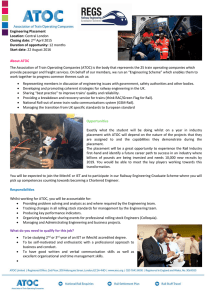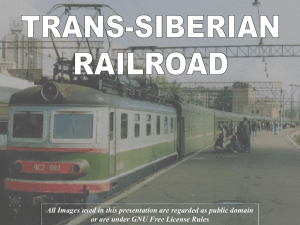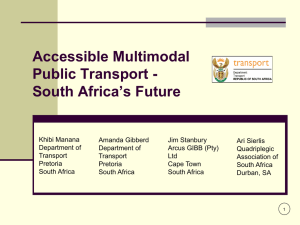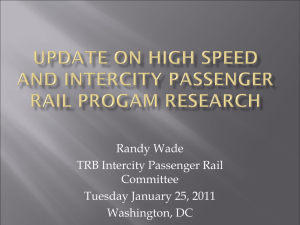How can we encourage more private investment in Britain`s
advertisement
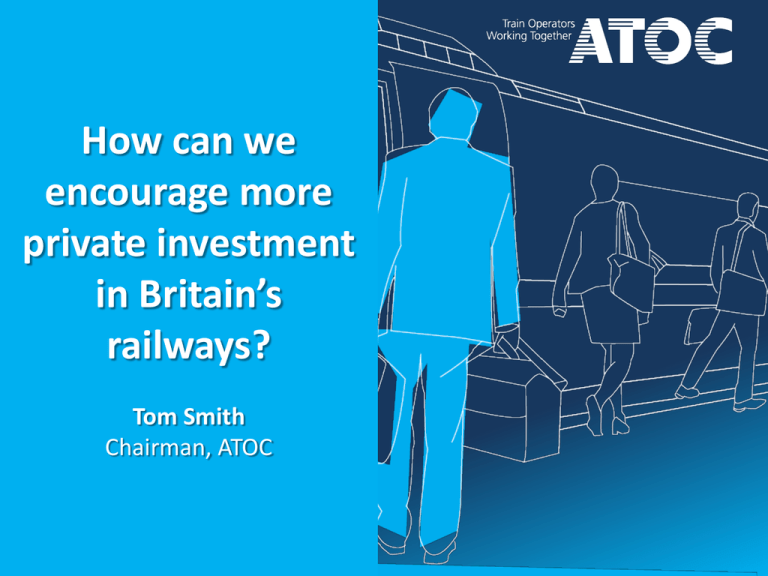
How can we encourage more private investment in Britain’s railways? Tom Smith Chairman, ATOC ATOC's mission is to work for passenger rail operators in serving customers and supporting a prosperous railway. Set up after privatisation in 1993, ATOC brings together all train companies to preserve and enhance the benefits for passengers of Britain’s national rail network. The privatisation success story • Passenger numbers increased by 69% • Historically high levels of passenger satisfaction • Highest number of rail journeys since the 1920s • Demand forecast to double in 25 years 0 2010-11… 2009-10 2008-09 2007-08 2006-07 2005-06 2004-05 2003-04 2002-03 2001-02 2000-01 1999-00 Nationalised 1998-99 1997-98 1996-97 1995-96 1994-95 1993-94 1992-93 1991-92 1990-91 1989-90 1988-89 1987-88 1986-87 1985-86 1984 1983 1982 1981 1,400 1980 1979 1978 1977 1976 1975 From a static to a dynamic national asset Passenger journeys (millions) 1975-2011 – Source: ORR Privatised 1,200 1,000 800 600 400 200 The McNulty challenge Costs (£bn) per passenger km – Source: Fig 3.6 McNulty full report The Initial Industry Plan response Costs, revenue and subsidy requirement, England & Wales to 2019 – Source: p7 IIP How do we get there? Franchise reform Longer, smarter franchises, allowing the private sector to invest and innovate Industry reform Progressively transform Network Rail to create contestability and accountability with infrastructure provision Targeted, sustained investment Need to keep investing in network and train capacity as demand continues to grow Smarter fares policy More flexible approach to fund investment, reduce taxpayer support and make better use of capacity Unlocking more private capital Targeted, sustained investment Need to keep investing in network and train capacity as demand continues to grow The good news • Long term nature of assets • Strong growth prospects • Weathering the downturn well • Railways have reasserted themselves as vital for the economy • Interested capital is there When it works, it works well Many good examples of private sector leadership on the railways New stations New trains New services New track The bad news • Investors are wary of rail • Confidence low because franchises seen as short and unpredictable • Government seen as ambivalent: • Wants innovation but unwilling to step back • And seems confused about the idea of railways generating private profit The outcome of this approach... 900 Total private sector investment (millions) in rail 2006-2011 (excluding Network Rail) 800 700 600 500 400 300 200 100 0 2006-07 2007-08 2008-09 2009-10 2010-11 Source: ORR Private sector vs. government Average age of rolling stock (yrs) 2000-2011 25 20 15 10 Strategic Rail Authority (procurement by TOCs) 5 Department for Transport (procurement by govt) 0 Q2 Q1 Q1 Q1 Q1 Q1 Q1 Q1 Q1 Q1 Q1 2000- 2001- 2002- 2003- 2004- 2005- 2006- 2007- 2008- 2009- 201001 02 03 04 05 06 07 08 09 10 11 Rolling stock proposals • More responsibility to TOCs • Industry to set an overall strategy • Government to set the strategic context (HLOS/SOFA) and use guarantees only where they might offer better value • ROSCOs to offer more flexibility on lease terms and maintenance arrangements • Holistic industry approach to rolling stock, embracing depot strategy, standardisation and supplier relationships Conclusions • We need to reverse the trend • Rail should be a magnet for private investment • Current industry reform agenda gives us the opportunity • Government needs to set the tone • Investors must respond How can we encourage more private investment in Britain’s railways? Tom Smith tom.smith@atoc.org Chairman, ATOC


